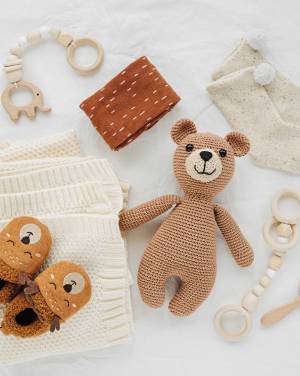When You Are Expecting Twins...
- Twin pregnancies usually come as a surprise because they are rare. They typically trigger mixed feelings, including excitement, joy, and concern about how to deal with this challenge.
- Expecting multiples is considered a high-risk pregnancy. This means that it is monitored more closely by medical professionals. Nevertheless, most twin pregnancies run smoothly.
- Twins are usually born slightly before their due date. Cesarean sections are more common, but vaginal births are also possible.
-
How soon can a doctor tell if you are having twins?
Planned or Unintended Pregnancy
Stages of Twin Pregnancies & Life Hacks
What is a high-risk pregnancy?
Reactions to a Twin Pregnancy Announcement
When will my twins arrive?
Preparing for a Twin Delivery — Vaginal Birth or C-Section?
Postpartum Recovery and Nursing Twins
Raising Twins — Organizing Helpers
Raising Twins as a Single Mom
Support for Parents of Multiples: Financial Aid and Practical Help
Conflicted about a Twin Pregnancy
Signs That I Might Be Having Twins
"Can I tell if I am expecting more than one?" So many women wonder, especially when experiencing unusual symptoms or deviations from previous pregnancies.
Since hCG levels (pregnancy hormones) are higher when expecting multiples, typical symptoms of early pregnancy are often more intense. These include both physical and emotional aspects.
Possible Signs of a Twin Pregnancy:
- More intense abdominal cramps because the uterus expands more rapidly
- Intense fatigue and drowsiness
- More severe morning sickness
- Unusual irritability and mood swings
However, more severe symptoms do not automatically mean more than one baby is on the way. Twin pregnancies can initially go completely unnoticed.
Your doctor can confirm whether you are pregnant with twins.
-
Twin pregnancies are usually detected during one of the first ultrasound examinations. When you are six weeks along, doctors can generally tell whether there is more than one amniotic sac. Sometimes this can be discerned as early as the 4th week of pregnancy. Moreover, between the 8th and 12th week, it is possible to see whether the twins are identical (monozygotic) or fraternal (dizygotic). About two-thirds of twins are fraternal.
In rare cases, their positioning in the womb allows twins to go undetected until much later.
🌱 Wondering how twins happen? Find out by going to How Do You Get Pregnant?ℹ️ An unusually high hCG level in the mother’s blood during early pregnancy may indicate the presence of multiples. However, this is not a definitive sign. A sure method of confirming multiple pregnancies is via ultrasound.
-
Seeing two amniotic sacs on the ultrasound does not necessarily mean that you will give birth to twins. Sometimes, one of the sacs vanishes. Vanishing Twin Syndrome is a type of miscarriage in multiple pregnancies where two or more sacs or embryos are visible on an ultrasound, but a later ultrasound shows one embryo less. The tissue of the missing embryo is absorbed by the surviving embryo and the mother. Vanishing Twin Syndrome is seen in 36% of twin pregnancies and 50% of pregnancies involving more than two gestational sacs and can happen anytime within the first trimester.
Surprise!
Even in cases where parents know that twins run in their family line, seeing two heartbeats on an ultrasound usually still comes as a surprise.
📈 What are the chances of having twins?
- Statistically, the chance of a multiple pregnancy increases with maternal age.
- Transferring more than one embryo after in vitro fertilization raises the likelihood of having multiples.
- In the US, 1 in 31 babies born is a twin (3.2% of births in 2021).
Nevertheless, very few parents expect to have more than one child at a time — it is extraordinary.
🤰🏻😲 Maybe you can identify with others who think expecting twins is scary and need time for the news to sink in. You may be experiencing contrasting feelings simultaneously: Joy and excitement because a twin pregnancy is special, but also trepidation, wondering, “How will I manage?"
-
If you had been trying for a baby, you were probably excited to find out you were expecting. You may already have one or more children and had hoped for one more.
Understandably, this unexpected turn of events would initially leave you groping for joy.
The question would undoubtedly arise, "How will I cope with two babies?"
If this is your first pregnancy, everything is exciting and new. Mentally preparing for this “double pack” can be overwhelming.
🙌 You are not alone! Our goal is to provide you with the most crucial information, allowing you to discover creative solutions necessary to thrive. -
An unplanned pregnancy can be confounding. Your carefully laid plans seem in disarray. Maybe it resulted from casual sex, or you are in a new relationship.
The news of twins may feel like the straw that broke the camel’s back. You may be thinking: "I might have been able to manage one baby, but two?!" Or “What if I become a single mom?"
🙌 You're not alone! We strive to provide you with information and counsel, allowing you to assess your thoughts and emotions and discern a way forward.
Stages of Twin Pregnancies & Life Hacks
Even if some of your pregnancy symptoms are more pronounced, the fact that you are carrying two little beings inside you may initially feel surreal. At first, you may not be able to get an ultrasound of both babies together because one may enjoy hiding.
As a rule, your body must work harder during a multiple pregnancy. Of course, two babies require more room and nourishment. Your blood volume and weight will need to be greater than with a singleton pregnancy. Therefore, a multiple pregnancy is often experienced as more strenuous: blood pressure may be elevated or water retention more severe. You will get bigger faster, and your belly will protrude more — even if twins are generally born prematurely and have a lower birth weight.
Self-Care
✅ Strengthen Your Back
Swimming, yoga, or pilates are good choices during pregnancy as long as you know which exercises to avoid. Wearing a brace may also provide some relief.
✅ Pamper Your Skin
When your bump starts to grow, your skin will be stretched. Applying cream 1-2 times daily may counteract unwanted stretch marks and keep your skin hydrated.
✅ Eat Well
While you don't necessarily have to eat more than during a singleton pregnancy, eating well will ensure you get the necessary nourishment.
✅ Listen to Your Body
Your body will signal new needs. For example, you may require more sleep than usual or desire snacks between meals. While regular exercise is necessary for a healthy pregnancy, you will probably need to prop your legs up from time to time.
✅ Consult Your Doctor or Midwife
Of course, this applies to situations where you are concerned about a symptom, need reassurance, or feel unwell.
-
Twin pregnancies are automatically classified as high-risk. This may sound concerning, but a high-risk status provides you with closer monitoring. More frequent check-ups will allow you to keep closer tabs on the babies’ growth and health.
👍 Twin pregnancy risk assessments are taken as a precautionary measure and to provide timely interventions when necessary.
What risks am I being monitored for?
- Miscarriage is more common when expecting multiples. Especially in the early weeks of pregnancy, one twin may stop developing and "quietly vanish.” Vanishing Twin Syndrome often goes unnoticed. Later in pregnancy, intrauterine fetal demise (IUFD) is also possible with very few or no tangible symptoms. The second twin is usually normal and healthy.
- In general, identical twin pregnancies are associated with more possible complications centered around whether the placenta (and amniotic sac) are shared.
- Twins are more likely to be premature. This is because two babies run out of room faster than a singleton, creating greater pressure on the cervix.
- The added weight can lead to cervical insufficiency, which is why physical exertion and intensive sports should be avoided.
Your doctor will closely monitor the twins’ development and assess for unequal weight gain at regular check-ups.
Twins are usually born slightly before their due date (around the 37th week) and have a low birth weight. Usually, twins also differ slightly in weight.
💕While mindfulness is essential in recognizing your physical needs and symptoms, try to strike a healthy balance between being concerned and relaxed. Talk to your doctor or midwife about any medical concerns that might come up.
-
The reactions of others can be intimidating. Perhaps you have been met with pity rather than joy so far. No one is calling it a "double blessing."
Others may have a hard time putting themselves in your shoes. But your friends’ and family’s reactions may also stem from loving concern because they are aware of the challenges — especially early on.
In time, mothers of multiples usually receive all the more recognition and admiration. They are typically given the support and respect they are due.
However, if you are not met with support right now, know that you can prove them wrong.
🧡 Tips:
- Decide to what extent you want to engage with unsupportive reactions or predictions. Sometimes you might fare better by ignoring them.
- You may find it more beneficial to focus on the unique aspects of having twins: When they get a bit older, they can be playmates, entertaining themselves rather than depending as much on you.
- Organizations provide support specifically to mothers of twins. Check the web for specifics. Skip to some resources listed below.
Giving Birth to Twins
Can I have a vaginal birth with twins? When does a cesarean become necessary? How can I prepare for delivery? What will it be like? Are twins always preemies?
Check out the FAQs below:
-
Twins are often born earlier than singletons.
On average, twins are delivered on week 37 or 38, weighing approx. 5.5lbs (2.5kg).
Term deliveries at 40 weeks are also possible.An earlier birth is more likely if the twins share a placenta (monochorionic) and even more so if they share the same sac (monochorionic-monoamniotic). Then, twins may be born as early as weeks 32 to 36.
🙌 You will be medically monitored according to the kind of twins you are expecting. Your doctor will prepare you for each step.
Having twins does not automatically mean having preemies. Twins are considered full-term at 38 weeks. If born earlier, they are likely to spend some time in an incubator — the duration depends on their week of gestation and birth weight.
👍 Our tip: Be ready by packing your hospital bag around week 30.
-
- Take part in a prematurity prevention program/preterm birth prevention clinic. Ask your doctor or search the web to find out where this is offered in your area.
- Twins are usually delivered in hospitals to ensure that you and your babies are well taken care of. Find out whether a hospital near you specializes in multiple births and has a NICU in case your babies are pre-term or have special health needs. Even if your hospital is not specialized in twin deliveries, any maternity ward is usually well-equipped to meet your needs.
- Sign up for a childbirth class for twins. This will help you to be better equipped during pregnancy, birth, and beyond. Search the web for courses near you. Two organizations that frequently offer classes are Twinversity and The Bump.
- Writing a birth plan will help things go as you envision. This may include whom you would like to invite into the delivery room, whether you would like to be offered pain control, and whether you desire to breastfeed.
- Consider hiring a doula. Professional birth support can set you up for success during the birth process and beyond.
-
Vaginal births of twins are possible and common. Nevertheless, C-sections are more frequent in twin pregnancies than with singletons. A cesarean may become medically necessary, for example, if the presenting baby is in a breech position or if the second twin is in a transverse position. Vaginal births are also not recommended if the twins share a placenta and amniotic sac.
No matter the type of delivery, expect more staff than during a singleton birth. Your doctor and nurse will be present, and a nurse for each baby. If the twins are premature, NICU staff will also be in attendance.
If the thought of having a C-section makes you feel anxious, planning the process may give you a stronger sense of control:
- Who do you want to have with you in the operating room? The baby's father? Your mother? A doula? Anticipating this emotional support can make a huge difference.
- How would you envision an ideal delivery — even if it must be a C-section? Would you like to request a clear drape rather than an opaque one so that you can witness the birth? Who would you want to be with the babies if you are not ready for them immediately after delivery?
- Is there anyone you can ask about their cesarean? Perhaps even a mother of twins? Hearing their stories may put your mind at ease.
👩⚕️If your doctor is pressuring you to have a scheduled C-section feel free to get a second opinion. It is usually possible to switch medical practitioners during your pregnancy.
Postpartum Recovery and Nursing Twins
During the first weeks, you have the extraordinary privilege of enjoying "two miracles" simultaneously. Nevertheless, having two babies also places a more significant strain on you.
Good preparation and support will go a long way!
-
Every woman’s experience with nursing is unique. Some mother-baby teams quickly get the hang of it without a glitch; other women and their babies undergo a longer learning curve. Sometimes women also learn that nursing is not possible for them.
Please be patient with yourself! Nursing is a learned skill. Give yourself and your babies time!
It is up to you whether and how frequently you want to nurse. The most important thing is that you do what works for you.
Most hospitals have lactation consultants who will teach you the ins and outs of nursing so that you can be a pro by the time you are discharged. Make use of this resource by asking for your lactation consultant.
You can also contact La Leche League International for further advice.
What is unique about nursing twins?
- Especially if the twins are premature, it may take a little while for your milk to come in. Your little ones may also still lack the strength to nurse.
- Consider investing in a breastfeeding pillow for twins, allowing you to breastfeed both babies simultaneously.
- In many cases, the mother’s milk production is insufficient to breastfeed twins exclusively. Breastmilk is then supplemented by formula.
-
The first few weeks after delivery are an extraordinary time.
You finally get to meet and hold your babies! But the weeks following the birth also need to be set apart for your recovery. Ideally, you would have support to use this time to rest, stay in bed, and recharge your batteries.
In addition to the physical exertion of childbirth, you are also dealing with hormonal changes triggered by the delivery and the onset of milk production. Many women feel more emotional and sensitive, maybe even weepy, during this period. This is also a natural part of postpartum adjustment.
During your recovery period, draw clear boundaries on whether and whom you would like to receive as visitors. Your well-being is what matters most right now.
Since the challenges of having twins are even more significant than with singletons, your maternity leave may be extended. Find your country below to find out more.
USA
- Your boss may grant you extra time off since you are expecting twins. This would be well worth asking.
United Kingdom
- In the UK, maternity leave is not altered by the number of babies. Maternity leave is granted for one year, and Statutory Maternity Pay is given for nine months. There is no additional time granted to the mother of twins.
Ireland
- In Ireland, maternity leave depends on the number of babies: 26 weeks for a singleton and an additional 26 weeks for each baby in a multiple birth.
Australian Commonwealth
- In Australia, your maternity leave is given per pregnancy, not per baby. Therefore, having multiples does not extend your maternity leave.
Canada
- In Canada, maternity leave does not change with twins or triplets. The length of time is given per pregnancy and not per baby.
New Zealand
- In New Zealand, primary carer leave does not change with twins or triplets. The length of time is given per pregnancy and not per baby.
South Africa
- In South Africa, you are granted four months of maternity leave. This does not change according to the number of babies.
Non-English-Speaking Countries
- Austria: Go to our Austrian page.
- Germany: Go to our German page.
- Italy: Go to our Italian page.
- Portugal: Go to our Portuguese page.
- Switzerland: Go to our Swiss page.
➡️ Twin Hack: Instead of (or additionally to) having a baby shower, ask people to make meals for you. You can even coordinate it through TakeThemAMeal.com.
Raising Twins
 1122478133 | Zoia Kostina | shutterstock.com
1122478133 | Zoia Kostina | shutterstock.com
Can I take care of two babies? Will I manage?
Many women worry about life after delivery.
👧🏻👧🏻 Of course, the desire for a happily ever after is inherent in all women. Having twins is extraordinary and special — an aspect you want to be able to enjoy. Twins are united in the womb and usually experience childhood and adolescence as a team. During infancy, they typically find each other’s presence soothing. As soon as they reach toddlerhood, they can be playmates and discover the world as a duo. Incidentally, many parents describe the toddler years as more manageable and peaceful because their twins keep each other occupied.
Still, early on, it is normal to be concerned about your needs as a mom or as a couple.
It is legitimate to worry that your needs may not be met, and it is all the more essential to know where to get advice, support, and relief.
-
🙌 Take time to prepare for the first six weeks after your twins’ arrival.
- Will your partner be able to take some time off work to support you?
- If possible, get grandmas, grandpas and aunts involved. Tip: Let them take care of the household and the grocery shopping, freeing you up to take care of the babies. Of course, you can also hand off the babies to take a nap.
- If you already have children, could childcare be helpful during the initial adjustment? Are your friends able to help out?
- In some regions, home help is provided to the parents of twins:
- In New Zealand, parents of twins can get 240 hours to be used within the babies' first 12 months. Higher multiples receive even more help.
- In South Australia, home help is organized through Multiple Birth SA Inc.
- Networking and communicating with other parents of multiples can be beneficial in feeling understood and learning what worked for others. Pick your favorite blog among these 70 top twin bloggers from around the globe. You may also like one of these top 15 preemie blogs.
-
Perhaps you are not in a committed relationship or may be concerned about becoming a single mom. Maybe you and your partner broke up recently, and now you are expecting twins.
While you may still be reeling from the breakup, you are probably more focused on what lies ahead. Of course, anyone in your shoes would long for an extra set of hands.
Having support is essential in this situation. For specifics, go to Support for Twin Moms.
You are not alone! Other single moms are walking the same road and have found what works (and what doesn't). You may benefit from joining the Single Moms of Multiples Facebook group or checking out the Raising Twins as a Single Mom blog.- 📗 Find more single mom hacks here.
- 🧔🏻♂️ Test: How Do I Respond If He Does Not Want the Babies?
-
Two babies at the same time: Do I need two of everything? And how am I to afford it?
It makes sense that you would expect to need duplicates of everything. But as a rule, you only need two of everything used simultaneously, such as car seats.
You may also want to invest in some specialty items:- A nursing pillow for twins (if you're going to breastfeed both at once).
- A twin stroller, which you can probably find cheaply secondhand.
Any shareable items, such as a changing table, a bathtub, or a swing, need not be purchased twice. Likewise, their clothes do not have to be matching.
Even a crib can be shared, provided you follow safety guidelines, such as placing the babies on their backs to sleep and avoiding pillows, blankets, and stuffed animals.
😉 Of course, you will need more diapers, care products, and food.
Click the tabs below for information on financial and practical assistance for parents of multiples.
➡️ You may also find local support by searching the web for "resources for twin parents near me."
-
USA
United Kingdom
- Your leave and maternity pay are unchanged with multiples.
- Sure Start Maternity Grant: £500 for twins, £1,000 for triplets.
- Best Start Grant (for Scotland)
- Child benefit for the firstborn twin will be £21.80 per week. The second-born will receive £14.45 per week. These rates will be lower if you already claim child benefits for older children.
Ireland
Australian Commonwealth
Canada
- The Canadian government does not offer additional financial assistance to parents of multiples. For support options, go to our non-profit section below.
New Zealand
South Africa
- The South African government does not offer additional financial assistance to parents of multiples. For support options, go to our non-profit section below.
Non-English-Speaking Countries
- Austria: Go to our Austrian page.
- Germany: Go to our German page.
- Italy: Go to our Italian page.
- Portugal: Go to our Portuguese page.
- Switzerland: Go to our Swiss page.
For more information about financial support, go to Financial Aid for Parents.
-
USA
- Twiniversity
- Twins Magazine
- Find a twin pregnancy support group by going to TwinStuff
- Multiples of America
- Raising Multiples (Mothers of Supertwins)
United Kingdom
- Twins Trust
- Twins Trust Northern Ireland, Scotland, Wales
- Join a local Twins Club!
- Home Start for Twins, Triplets, and Multiple Children
Ireland
- Irish Multiple Births Association
- Twins Trust supports new families of multiples.
Australian Commonwealth
- Twinfo
- Twins Trust
- Parents of Multiples Australia Facebook Page
- Australian Multiple Birth Association (AMBA)
- Brisbane Multiple Birth Association Northside (BMBAN)
- Things for Twins
- Twin Research Australia
- Supporting Families with Twin Babies or More: The University of Melbourne
Canada
New Zealand
South Africa
Non-English-Speaking Countries
- Austria: Go to our Austrian page.
- Germany: Go to our German page.
- Italy: Go to our Italian page.
- Portugal: Go to our Portuguese page.
- Switzerland: Go to our Swiss page.
For more information on practical support, go to Support Near Me.
Conflicted About a Twin Pregnancy
You may feel like you have reached your breaking point. This would hinder you from feeling joy or anticipation, as hard as you may try.
Perhaps this pregnancy was unplanned, or other concerns feel all-consuming. This may lead you to think about abortion. Maybe you have read this article because you feel unsure about which way to go.
- ⚖️ Should I have an abortion? Take the Abortion Test and receive an immediate evaluation.
- 💚 Wondering how to make a good decision? Read the article and learn hacks.
Perhaps your doctor shared some disturbing news after your prenatal testing. You may wonder whether to have a selective abortion, reducing your pregnancy to a singleton. Generally, this procedure is only performed in rare circumstances. For more information, go to Selective Abortion.
When dealing with issues that shake you to the core, seek support! Is there anyone you feel comfortable sharing your situation with — someone who will listen rather than manipulate?
🧡 Our goal is to help you find answers that resonate with you. Our digital coaching resources were designed as a sounding board, allowing you to discern which path is right for you.
- 💪 Wondering whether you have what it takes? Strengths Finder Test
- 👥 What would motherhood look like for you? Personality Test
- 🩺 Should I Have a Fetal Defect Abortion? — multiple-choice test.


















